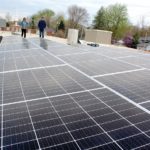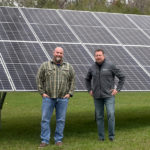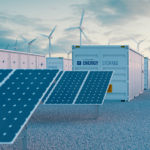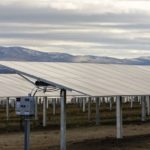Vermont has seen a huge increase in the use of solar panels in recent years. And that’s thanks in part to financial incentives the state has given to solar developers.
But there’s a debate going on about how much money solar power developers should receive going forward.
VPR’s Mitch Wertlieb spoke with southern Vermont reporter Howard Weiss-Tisman about whether the new state net meter rules reduce the incentives developers are now getting for their solar projects. Their conversation below has been edited and condensed for clarity.
Mitch Wertlieb: So let’s start by explaining exactly what net metering is.
Howard Weiss-Tisman: Net metering is basically a way for people with solar panels to send the power that they generate back into the electric grid. And if you think, you know, back before net metering, if you had a solar panel, it would basically power your house or a battery. But net metering allows you to hook right into the grid.
A lot of states are allowing metering. Now, here in Vermont, developers and homeowners with solar panels, they get sort of an incentive and a premium. There are a lot of ways to measure how much power is generated and consumed.
But on most lists, Vermont is one of the top states in the country that’s generating solar power. Right now, the amount of solar power here has increased by more than 500% over the past 10 years.
Vermont Department of Public Service, Courtesy
/
The amount of net metered solar installations has steadily increased in Vermont since 2010.
That seems like a good thing. I mean, most people think solar power is a good way to cut down on fossil fuels. Why do some people think there should be fewer financial incentives, then?
Well, when the law was written, solar equipment was expensive. And so incentives were put in place to spur development. And under the net meter program, power companies, they have to pay kind of a premium for this power, and a lot has changed since then.
And so the power companies, they say that they can buy renewable energy much cheaper from larger solar projects. So the power companies and the Department of Public Service, they argue that these incentives are actually making renewable energy more expensive.
They say that net-metered systems that are out there, these extra costs are kind of being paid by everyone else who’s paying electric bills. And this comes at a time when the state’s trying to push electric cars and electric heat pumps. And so the groups that are arguing for these lower incentives, they say that it’s going to be harder and harder for folks to agree to get an electric car if the rates keep going up.
“Lower-income customers have not benefited from the current construct of net metering as much as higher-income customers.”
TJ Poor, Department of Public Service
This is what TJ Poor from the Department of Public Service said:
“Lower-income customers have not benefited from the current construct of net metering as much as higher-income customers,” Poor said. “And so we need to work on other ways to deliver the benefits of the energy transition to lower-income customers.”
So state regulators right now, they’re updating the net meter rules, and the Public Utility Commission recently released those draft rules.
OK, so what’s in those draft rules? Howard, did they decide to pull back on those incentives at all?
Well, they did not do it right now. There are a couple of things going on.
So outside of these rules, the state looks at the rates every couple of years, and they are expected to drop that rate by about a penny. And there’s contention over that as well, you know, but in these new net meter rules, there was a bigger argument about changing the structure and really reducing the incentives kind of on a long-term basis.
Jonathan Dowds is with Renewable Energy Vermont, that’s an advocacy group that represents solar developers. And he says it’s the wrong time to lower incentives.
“So I think just looking at what’s the per-kilowatt-hour cost that you can buy from a utility-scale solar plant, and what’s the per-kilowatt-hour cost you’re getting from a net metering site? I don’t know that that goes deep enough. And I don’t know that it goes far enough,” Dowds said. “And from a climate perspective, we need as much of both as we can get, as quickly as possible. So the last thing I think we should be doing as a state to hit our climate goals and our energy goals is slowing down the deployment of clean energy resources.”
“The last thing I think we should be doing as a state to hit our climate goals and our energy goals is slowing down the deployment of clean energy resources.”
Jonathan Dowds, Renewable Energy Vermont
So as state regulators were looking at this net metering rule, they just thought it was too complicated to tackle right now. So the rules are out. There are some changes being suggested with the permitting. But they did not address this bigger issue of making structural changes to the net metering system.
California is having a similar discussion right now. And that state is kind of seen as a leader in solar development and incentive programs. And so both sides of the issues thought that it made sense for Vermont to kind of wait and see what California does before any changes are made here in Vermont.
Well, what can we expect next here in Vermont, Howard?
There are a lot of things going on. So this biannual rate decision is expected within a few weeks, and like I said, it’s probably going to drop the rate by about a penny or so right now.
The PUC has collected final comments on its draft proposal, and the three-member Public Utility Commission will be making decisions on that.
And once California makes a decision on its net meter rules, we’re likely to see the issue coming back here in Vermont. I spoke to someone at the Public Utility Commission, and he said it just was too complicated right now to take on, but it is something that will likely be coming up again here in Vermont.
Have questions, comments or tips? Send us a message or get in touch with reporter Howard Weiss-Tisman @hweisstisman.





















Recent Comments